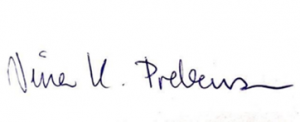184 Letter from Nina Katrine Prebensen

Dear tourism researchers
Talking and writing in the academic environment – the role of vulnerability
I have learned many lessons through my academic journey. The impact of vulnerability through communicating your knowledge is one of them. I think that the spoken word is relatively easy, while writing a text with meaning is hard. Talking and discussing are important academic processes. However, communicating through written texts make the meaning more to the point and therefore more vulnerable as the written text is easier to debate, criticize and to argue against than spoken words.
I remember one of my first conferences I attended. I received verbal feedbacks, where some were about the project I presented, and some commented on other things I should do. And some academics just wanted to say something. The feeling of being vulnerable hit me.
Welcoming feedback is necessary to grow as an academic – but it is what it is. If it is just a question, a debate or a discussion – it may or may not help you to grow as an academic. The key is to think of it as a potential help to improve your text, and not as a personal characteristic.
The spoken and the written text may function differently, dependent of 1) the sender, 2) the receiver, 3) the meaning intended and interpreted. All inputs may be interesting, however not all of them relevant for the current paper.
My impression is that people (sender) often include too many variables into one sentence. It is then up to the receiver of the text to examine – and interpret the meaning of the words and the text. I always think of this when tutoring master and PhD students. What do you want to figure out? Please write down the one thing you want to explore, describe or test. This exercise helps to focus and to approach research in a systematic way and include variables one-by-one into the framework: define them and explain why you think they are important to elaborate on.
One way to deal with all types of feedbacks are to welcome it and think of the inputs one by one – after your presentation is over. Some inputs are relevant and will help you improve your paper. Some will be interesting for another paper – and some you will find irrelevant. This exercise helps you improve as a researcher. I would urge you to not take this feedback personally: it is not about liking you or the text, it is about moving knowledge further. The most important way to grow as a researcher is to ask and welcome questions and comments but do take it for what it is: well-meaning suggestions to improve your work. You decide what to include in your text.
Best Wishes
Nina Katrine Prebensen
University of South-Eastern Norway


